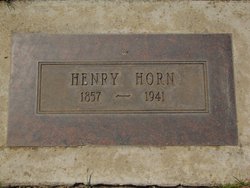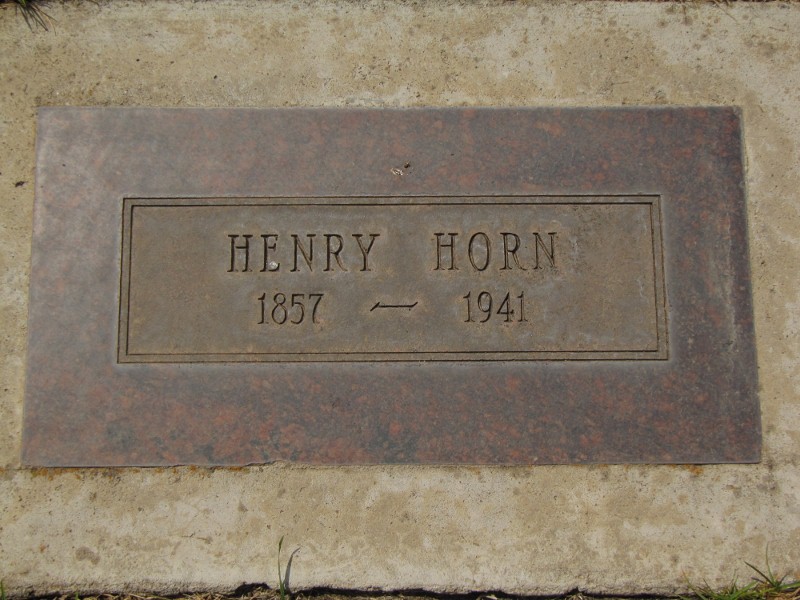(Condensed from an obit & historical by his son)
With the burial of Henry Horn, 84, in the Ritzville cemetery Sunday afternoon, the last surviving male pioneer of the earliest vintage in Ritzville was laid to rest. He died Wednesday, January 22, in Stanwood at the home of his son, Raymond and services were held in the C. J. Gunderson chapel, West Standwood, Saturday and the body was brought to Ritzville for quiet burial on Sunday at 2 p.m. in accordance with his expressed desires.
Born in Elkader, Iowa on June 9, 1857, the son of Ferdinand and Katherine Horn, German emigrants to American in 1849, Henry Horn apprenticed at an early age to the blacksmith trade under an older brother, Joseph Horn, and later moving to Yakton South Dakota.
Henry Horn was among a group of South Dakota settlers to come to Walla Walla, either seperately or in small groups in the late '70s. Among these familes were those of the Harris, Bennett, Keller, McKay and Sinclairs. Horn's arrival was made via an emigrant train, a passenger coach attached to a freight, to San Francisco and then via steamboat up to the mouth of the Columbia River. He took a river boat up the Columbia to Ainsworth landing and then by wagon to Walla Walla.
He drove supplies for pioneer merchants, miners and for the military service from Walla Walla to Spokane Falls, which was a small white settlement and it was on one of these trips he spent his first night in the vicinity of Ritzville. Late in the fall of 1879, he unhitched his team near the foot of Thom's butte, southwest of town, near the homestead building of the J. M Harris family. By 1883 he was in Walla Walla and saw operations starting at Ainsworth landing, about three miles down the Snake River, near the eventual town of Pasco, the beginning of the building of the Spokane-Pasco division of the Northern Pacific railway. He worked with a group of contractors headed by Phillip Ritz, for whom the town of Ritzville was later named. Through his blacksmithing skills he found himself in an essential occupation in a booming industry of handling the extremely heaving forgings which were so necessary for the rail lines. He developed the skill ad dexterity in handling steel that later endeared him to the farmers and others in the area. Upon completion of the Northern Pacific, Horn quit the employment of the railroad and establishe a shop in the developing town of Ritzville, He operated the shop until the early '20s. when he became blacksmith for the Triangle Construction Co. and Adams county. He retired in 1926, when an accident resulted in a broken hip bone.
In 1884 Henry Horn was united in marriage to Margaret Sinclair, daughter of George Sinclair. Having established a homestead immediately north of town, Horn built the residence in which he was to live for over 50 years, until the death of his wife in 1937.
To this marriage were born four children; George, dying in infancy, and in keeping with the early day custom, was buried on the home farm; William Sinclair Horn, late assitant professor of agricultural education at Washington State College; Everett E. Horn, biologist with the U. S. Bureau of Biological Survey at Berkeley, Calif., and Raymond Horn, co-publisher of the Twin city News at Standwood.
Ritzville Journal Times & Raymond Horn February 1941 Sue Gardner & gapwork90
(Condensed from an obit & historical by his son)
With the burial of Henry Horn, 84, in the Ritzville cemetery Sunday afternoon, the last surviving male pioneer of the earliest vintage in Ritzville was laid to rest. He died Wednesday, January 22, in Stanwood at the home of his son, Raymond and services were held in the C. J. Gunderson chapel, West Standwood, Saturday and the body was brought to Ritzville for quiet burial on Sunday at 2 p.m. in accordance with his expressed desires.
Born in Elkader, Iowa on June 9, 1857, the son of Ferdinand and Katherine Horn, German emigrants to American in 1849, Henry Horn apprenticed at an early age to the blacksmith trade under an older brother, Joseph Horn, and later moving to Yakton South Dakota.
Henry Horn was among a group of South Dakota settlers to come to Walla Walla, either seperately or in small groups in the late '70s. Among these familes were those of the Harris, Bennett, Keller, McKay and Sinclairs. Horn's arrival was made via an emigrant train, a passenger coach attached to a freight, to San Francisco and then via steamboat up to the mouth of the Columbia River. He took a river boat up the Columbia to Ainsworth landing and then by wagon to Walla Walla.
He drove supplies for pioneer merchants, miners and for the military service from Walla Walla to Spokane Falls, which was a small white settlement and it was on one of these trips he spent his first night in the vicinity of Ritzville. Late in the fall of 1879, he unhitched his team near the foot of Thom's butte, southwest of town, near the homestead building of the J. M Harris family. By 1883 he was in Walla Walla and saw operations starting at Ainsworth landing, about three miles down the Snake River, near the eventual town of Pasco, the beginning of the building of the Spokane-Pasco division of the Northern Pacific railway. He worked with a group of contractors headed by Phillip Ritz, for whom the town of Ritzville was later named. Through his blacksmithing skills he found himself in an essential occupation in a booming industry of handling the extremely heaving forgings which were so necessary for the rail lines. He developed the skill ad dexterity in handling steel that later endeared him to the farmers and others in the area. Upon completion of the Northern Pacific, Horn quit the employment of the railroad and establishe a shop in the developing town of Ritzville, He operated the shop until the early '20s. when he became blacksmith for the Triangle Construction Co. and Adams county. He retired in 1926, when an accident resulted in a broken hip bone.
In 1884 Henry Horn was united in marriage to Margaret Sinclair, daughter of George Sinclair. Having established a homestead immediately north of town, Horn built the residence in which he was to live for over 50 years, until the death of his wife in 1937.
To this marriage were born four children; George, dying in infancy, and in keeping with the early day custom, was buried on the home farm; William Sinclair Horn, late assitant professor of agricultural education at Washington State College; Everett E. Horn, biologist with the U. S. Bureau of Biological Survey at Berkeley, Calif., and Raymond Horn, co-publisher of the Twin city News at Standwood.
Ritzville Journal Times & Raymond Horn February 1941 Sue Gardner & gapwork90
Family Members
Sponsored by Ancestry
Advertisement
Advertisement





